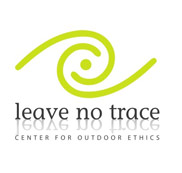Leave No Trace

The Atlanta Ourdoor Club is pleased to be a supporter of Leave No Trace and encourages everyone to leave the environment in a responsible manner when they are finished with each club event. You can accomplish this by utilizing the seven simple Leave No Trace principles below:
Seven Principles of Leave No Trace
- Plan Ahead and Prepare
- Travel and Camp on Durable Surfaces
- Dispose of Waste Properly
- Leave What You Find
- Minimize Campfire Impacts
- Respect Wildlife
- Be Considerate of Other Visitors
Seven Principles of Leave No Trace
1. Plan Ahead and Prepare
- Know the rules and regulations for the area you'll visit.
- Prepare for extreme weather, hazards, and emergencies.
- Schedule your trip to avoid times of high use.
- Visit in small groups when possible. Consider splitting larger groups into smaller groups.
- Repackage food to minimize waste.
2. Travel and Camp on Durable Surfaces
- Durable surfaces include established trails and campsites, rock, gravel, dry grasses or snow.
- Protect riparian areas by camping at least 200 feet from lakes and streams.
- Good campsites are found, not made. Altering a site is not necessary.
- Walk single file in the middle of the trail, even when wet or muddy
- Concentrate use on existing trails and campsites.
- Keep campsites small. Focus activity in areas where vegetation is absent
3. Dispose of Waste Properly
- Pack it in, pack it out. Inspect your campsite and rest areas for trash or spilled foods. Pack out all trash, leftover food, and litter.
- Deposit solid human waste in privy toilet found on all backcountry campsite and on some popular portages.
- If away from a privy dig a cathole, 6 to 8 inches deep at least 200 feet from water, camp, and trails. Cover and disguise the cathole when finished. Pack out toilet paper and hygiene products.
- To wash yourself or your dishes, carry water 200 feet away from streams or lakes and use small amounts of biodegradable soap.
4. Leave What You Find
- Preserve the past: examine, but do not touch, cultural or historic structures and artifacts.
- Leave rocks, plants and other natural objects as you find them.
- Avoid introducing or transporting non-native species.
- Do not build structures, furniture, or dig trenches.
5. Minimize Campfire Impacts
- Campfires can cause lasting impacts to the backcountry. Use a lightweight stove for cooking and enjoy a candle lantern for light.
- Where fires are permitted, use established fire rings.
- Keep fires small. Use sticks from the ground that can be broken by hand.
- Burn all wood and coals to ash, put out campfires completely, upon departure ashes should be cool to the touch.
6. Respect Wildlife
- Observe wildlife from a distance. Do not follow or approach them.
- Never feed animals. Feeding wildlife damages their health, alters natural behaviors, and exposes them to predators and other dangers.
- Protect wildlife and your food by storing rations and trash securely. Follow the bear safety rules
- Control leashed pets at all times, or leave them at home.
7. Be Considerate of Other Visitors
- Respect other visitors and protect the quality of their experience.
- Be courteous. Yield to other users on the trail, especially those who carry canoes or heavy loads.
- Take breaks away from trails and other visitors.
- Let nature's sounds prevail. Avoid loud voices and noises.
- Keep cell phones and other electronic devices on "vibrate" or "silent" mode or better yet, turned off until really needed.
Learn more about Leave No Trace



